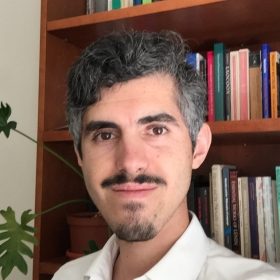Education
- Ph.D. in Slavic Languages and Literatures, Yale University, 2015
- M.Phil. in Slavic Languages and Literatures, Yale University, 2013
- B.A. in Global Studies, concentration in Russian and Post-Soviet Studies (summa cum laude), College of William and Mary, 2009
Research
I study Russian literature of the age of realism—a period spanning roughly the second half of the nineteenth century—in its relation to its intellectual, social, and ideological contexts, both in the Russian Empire and Europe. Beyond the study of nineteenth-century prose, my research extends to a number of topics, including nineteenth- and twentieth-century European and Russian philosophy and aesthetic theory, Soviet literature and film, and national and cultural identity in Eastern Europe.
My first book, Russia’s Capitalist Realism: Tolstoy, Dostoevsky, and Chekhov (Northwestern University Press, 2020) investigates how the Russian realist prose tradition confronted the representational challenges posed by nascent capitalism. In a situation of threatening and unprecedented change, literature did not passively reflect existing economic conditions so much as it helped to define what Russian capitalism could mean. Drawing on a wide range of periodicals, works of journalism and scholarship, and important but little-read novels, my book locates Russian realism’s intervention in an ongoing public discourse about the meanings and effects of economic and social change. Seen in this light, I argue that the much-discussed belatedness of Russian culture provided its literature with a vantage point from which to anticipate the effects of industrialization, commodification, and the new spaces and rhythms of capitalism.
Uniting the various threads of my research are persistent questions about the work that literary form does—the ideological problems that it solves or reveals, the emergent phenomena that it renders legible, and the ways that it helps people make sense of the world in which they live. Throughout my work, I try to remain attentive to how works of literature are situated in history, how they respond to the past and anticipate the future. In the process, I aim to reconcile formalist and historicist approaches to literary study by examining how fiction articulates historical change and how changing historical conditions call for new forms of representation.
Publications
Monograph
- Russia’s Capitalist Realism: Tolstoy, Dostoevsky, and Chekhov. Evanston, IL: Northwestern University Press, 2020.Shortlisted for the 2021 American Association of Teachers of Slavic and East European Languages (AATSEEL) Best First Book Award
Journal Articles
- “Myshkin’s Million: Merchants, Capitalists, and the Economic Imaginary in The Idiot.” Russian Review 77 (April 2018): 241–58.
- “On the Hegelian Roots of Lukács’s Theory of Realism.” Studies in East European Thought 65, no. 3 (2014): 259–69.
- “The Problem of Postmodernism in Russian Literary History: A Comparative Reading of Summer in Baden-Baden and Moscow to the End of the Line.” Studies in Slavic Cultures 9 (2012): 23–46.
Chapters in Edited Volumes
- “Reading Money in Crime and Punishment.” In Approaches to Teaching Crime and Punishment. Edited by Michael R. Katz and Alexander Burry. Modern Language Association, forthcoming 2022.
- “Money.” In Chekhov in Context. Edited by Yuri Corrigan. Under advance contract with Cambridge University Press.
- “The Greasy-Haired Pawnbroker and the Capitalist Raskrasavitsa: Dostoevsky’s Businesswomen.” In Dostoevsky at 200. Edited by Kate Holland and Katherine Bowers, 61–80. Toronto: University of Toronto Press, 2021.
- “Kapitalizm kak povestvovatel’naia problema, ili Pochemu den’gi ne goriat v romane F. M. Dostoevskogo ‘Idiot.’” [Capitalism as a Narrative Problem; or Why Money Does Not Burn in F. M. Dostoevsky’s The Idiot], trans. Margarita Vaysman. In Russkii realizm XIX veka. Obshchestvo, znanie, povestvovanie. Sbornik statei [Nineteenth-Century Russian Realism. Society, Knowledge, Narrative. A Collection of Articles]. Edited by Margarita Vaysman, Aleksei Vdovin, Ilya Kliger, and Kirill Ospovat, 272–95. Moscow: Novoe literaturnoe obozrenie, 2020.
Contributions to Reference Works
- “The Elusive Avengers.” In Directory of World Cinema: Russia 2. Edited by Birgit Beumers, 77–78. Bristol, UK: Intellect, 2015.
- “Vasilisa the Beautiful.” In Directory of World Cinema: Russia. Edited by Birgit Beumers, 254–55. Bristol, UK: Intellect, 2011
Book Reviews
- Jillian Porter, Economies of Feeling: Russian Literature under Nicholas I. Evanston: Northwestern University Press, 2017. Modern Language Quarterly 80, no. 1 (March 2019): 106–08.
- Vasily Sleptsov. Hard Times: A Novel of Liberals and Radicals in 1860s Russia. Trans. Michael R. Katz. Introduction by William C. Brumfield. Pittsburgh: University of Pittsburgh Press, 2016. Slavic and East European Journal 61, no. 3 (Fall 2017): 596–97.
Writing for a Broader Audience
Courses
Graduate
- Nineteenth-Century Russian Literature: The Age of Realism
- Literary Proseminar
- Twentieth-Century Russian Literature, 1930-1989
- Seminar in Nineteenth-Century Russian Literature
- RUSSN C224T: Studies in Russian Literature: Tolstoy
Undergraduate
- The Golden Age and Great Realists
- Introduction to Russian and Soviet Cinema
- Russian Civilization in the Twentieth Century
- Russian Prose Fiction: Introduction to the Analysis of Russian Narrative Prose
- Studies in Russian Literature: Tolstoy
- Fiat Lux: Language, Identity, and Power in the Post-Communist World (team-taught course with faculty from SEEELC)
Honors Theses and Directed Independent Study
- Madness in Chekhov and Gogol
- Close Analysis of Dostoevsky’s Crime and Punishment
- Nineteenth-Century Russian Literature and the Railroad
- Russian Legal Reforms in the 1860s
- Chekhov’s Sakhalin Island and the Temporality of Imprisonment
Fields of Interest
- Nineteenth-century Russian literature, culture, and intellectual history
- Theory of the novel
- Realist aesthetics
- Continental philosophy and cultural theory
- Literature and economics
- National and transnational postmodernisms in Russia, eastern Europe, and beyond
- Soviet cinema, especially of the 1920s–1930s and the Thaw
- Soviet nationality policy and ideology
- Russian and Soviet Jewish culture




